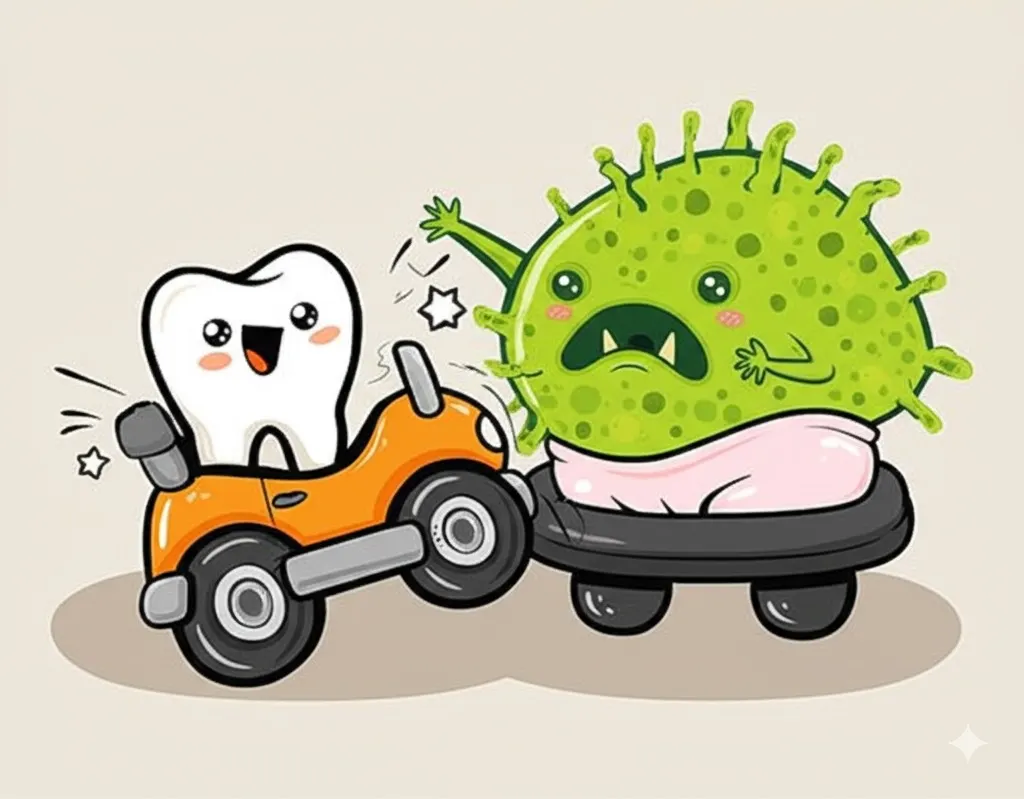Healthy Gums and Arthritis: The Oral Health Connection
By Mandy Davidson on 3/30/2025

Recent research has revealed a compelling relationship between oral health and rheumatoid arthritis (RA), suggesting that what happens in your mouth may significantly influence joint health. This connection represents an important frontier in our understanding of how different systems in the body influence each other, particularly for older adults who face increased risk for both conditions.
The Surprising Connection Between Gums and Joints
Periodontal disease and rheumatoid arthritis might seem unrelated at first glance. One affects the tissues surrounding teeth, while the other primarily impacts joints. Yet studies consistently show these conditions share remarkable similarities in their inflammatory processes and may directly influence one another.

Research published in the Journal of Clinical Medicine found that moderate to severe periodontitis is significantly more common in people with rheumatoid arthritis. More striking, the study revealed that “ACPA positivity was significantly more frequent in the moderate/severe periodontitis group (86%) compared to those with mild or no periodontitis (50%).” These ACPAs---anti-citrullinated protein antibodies---are specific markers associated with rheumatoid arthritis progression.
Participants who brushed their teeth more than three times a day had a decreased risk of RA by 24% compared to those brushing once daily or less.
– Based on findings from Chang et al.'s nationwide cohort study published in the Journal of Personalized Medicine (2023)A comprehensive analysis examining the link between oral health and arthritis found that an overwhelming 94% of studies confirm this relationship. The evidence suggests this isn’t merely a correlation but potentially a causative relationship working in both directions.
Understanding the Inflammatory Connection
Both periodontitis and rheumatoid arthritis are characterized by chronic inflammation and bone destruction. In periodontitis, inflammation begins in the gum tissues surrounding teeth and can eventually lead to bone loss and tooth destabilization. Similarly, RA involves inflamed joint linings that eventually damage cartilage and erode bone.
The link between these conditions appears to involve specific oral bacteria that may trigger or worsen autoimmune responses throughout the body. A study in Scientific Reports found that “RA patients had a higher bacterial load, a more diverse microbiota, an increase in bacterial species associated with periodontal disease, more clinical attachment loss, and increased production of inflammatory mediators.”
These findings suggest that oral bacteria don’t just stay in the mouth---they can enter the bloodstream and potentially influence inflammatory processes elsewhere in the body, including the joints.
The Bacterial Culprits
Two bacteria in particular have garnered significant attention in the oral health-arthritis connection: Porphyromonas gingivalis and Aggregatibacter actinomycetemcomitans. These microorganisms produce enzymes that can modify proteins in the body through a process called citrullination.
This process changes the structure of normal proteins, potentially making them unrecognizable to the immune system. When the body encounters these altered proteins, it may produce antibodies against them---the very same antibodies (ACPAs) that are hallmarks of rheumatoid arthritis.
Dr. Kaja Eriksson and colleagues demonstrated in their research that “moderate/severe periodontitis in RA patients is significantly associated with ACPA positivity, an altered subgingival microbial profile, and increased levels of systemic and oral inflammatory mediators.” This finding emphasizes how oral bacteria may play a key role in triggering and sustaining the autoimmune processes characteristic of RA.
Can Improving Oral Health Help Manage Arthritis?
The evidence increasingly suggests that maintaining good oral health may not only prevent periodontitis but could potentially reduce the risk and severity of rheumatoid arthritis. A nationwide cohort study published in the Journal of Personalized Medicine found that
better oral hygiene behaviors, such as a higher frequency of daily tooth brushing and a recent history of dental scaling, were associated with a lower occurrence of RA.
This preventive effect appears substantial. The study reported that “participants who brushed their teeth more than three times a day had a decreased risk of RA” compared to those with poorer oral hygiene habits. Regular professional dental cleanings showed similar protective effects.

Even for those already diagnosed with RA, periodontal treatment appears beneficial. Multiple studies have shown that non-surgical periodontal therapy---scaling and root planing, combined with improved oral hygiene---can reduce inflammatory markers associated with RA and may improve clinical RA outcomes.
A qualitative study examining periodontal assessment and treatment among individuals at risk of rheumatoid arthritis concluded that “periodontitis could be a causal risk factor for rheumatoid arthritis onset and progression, and early periodontal intervention in individuals at-risk of RA could delay progression or prevent it entirely.”
Recognizing the Warning Signs
Given this connection, recognizing the signs of periodontal disease becomes even more crucial, especially for those with a family history of rheumatoid arthritis or early joint symptoms. The warning signs of periodontal disease include:
- Persistent bad breath
- Red, swollen, or tender gums
- Bleeding while brushing or flossing
- Receding gums
- Loose or shifting teeth
- Changes in how teeth fit together when biting
Early detection of these symptoms allows for prompt intervention, which may not only save your teeth but potentially reduce your risk of developing or worsening arthritis.
The Importance of Professional Dental Care
Professional dental cleanings remove bacterial plaque and calculus (tartar) that cannot be eliminated through home care alone. These cleanings, particularly scaling and root planing for those with periodontitis, significantly reduce the bacterial load and inflammation in the mouth.
Early periodontal intervention in individuals at-risk of RA could delay progression or prevent it entirely.
– From Chapman et al.'s qualitative study examining periodontal assessment and treatment among individuals at risk of rheumatoid arthritis (2023)Dr. Yoonkyung Chang and colleagues found that “dental scaling was related to a lower risk of occurrence of RA than those who did not receive scaling,” highlighting the importance of regular professional dental care beyond just maintaining oral health.
For those already diagnosed with RA, dental professionals need to be part of the healthcare team. The research by Dr. Eriksson emphasizes that “monitoring the periodontal health of RA patients is particularly important” due to their increased susceptibility to periodontal disease and its potential impact on their arthritis.
Creating an Effective Oral Health Routine
For those looking to reduce their risk of both periodontal disease and potentially arthritis, an effective oral hygiene routine is essential. Research supports these key practices:
- Brush thoroughly at least twice daily, ideally after meals, using a soft-bristled toothbrush and fluoride toothpaste. The study by Chang et al. found that brushing three or more times daily was associated with a 24% lower risk of developing RA compared to brushing once daily or less.
- Clean between teeth daily using floss, interdental brushes, or water flossers to remove bacteria from areas toothbrushes cannot reach.
- Consider antimicrobial mouthwashes to reduce bacterial load, particularly if you’re at higher risk for periodontitis.
- Schedule regular dental checkups and professional cleanings. The frequency should be determined by your dental professional based on your individual risk factors.
- Address risk factors such as smoking, which significantly increases the risk of both periodontitis and rheumatoid arthritis.
The Future of Integrated Care
The emerging understanding of the oral-joint connection points toward more integrated approaches to healthcare. Rather than treating the mouth and joints as separate systems, future care models may emphasize collaboration between dental professionals and rheumatologists.
Early periodontal screening for those with RA risk factors, and arthritis awareness in dental offices, especially for patients with severe periodontitis, could become standard practice as this relationship becomes better understood.
Conclusion
The connection between oral health and rheumatoid arthritis highlights the interconnected nature of our body’s systems. Far from being isolated conditions, periodontitis and RA share inflammatory pathways and may directly influence each other’s progression.
By maintaining excellent oral hygiene and seeking regular professional dental care (roughly every 3-6 months for a periodontal cleaning/scaling), you may not only preserve your smile but potentially protect your joints as well. As one review in the Journal of Clinical Periodontology concluded,
“maintaining good oral hygiene and regular dental care can potentially mitigate the risk and severity of RA, emphasizing the need for multidisciplinary approaches in managing these interconnected health issues.”
For residents of downtown Toronto looking to protect both their oral and joint health, scheduling comprehensive periodontal assessments as part of regular dental care represents a proactive step toward overall wellness. This integrated approach to health maintenance reflects our evolving understanding of how local inflammation can influence systemic conditions---and how targeted care in one area might yield benefits throughout the body.
References
- Eriksson K, Fei G, Lundmark A, et al. Periodontal Health and Oral Microbiota in Patients with Rheumatoid Arthritis. J Clin Med. 2019;8(5):630.
- Chang Y, Chung MK, Park JH, Song TJ. Association of Oral Health with Risk of Rheumatoid Arthritis: A Nationwide Cohort Study. J Pers Med. 2023;13(2):340.
- Corrêa JD, Fernandes GR, Calderaro DC, et al. Oral microbial dysbiosis linked to worsened periodontal condition in rheumatoid arthritis patients. Sci Rep. 2019;9(1):8379.
- Chapman LS, Vinall-Collier KA, Siddle HJ, Mustufvi Z, Mankia K, Serban S. Periodontal assessment and treatment among individuals at-risk of rheumatoid arthritis: A qualitative study. Rheumatology. 2023;62.
- de Pablo P, Dietrich T, McAlindon TE. Association of periodontal disease and tooth loss with rheumatoid arthritis in the US population. J Rheumatol. 2008;35(1):70-76.
- Fuggle NR, Smith TO, Kaul A, Sofat N. Hand to Mouth: A Systematic Review and Meta-Analysis of the Association between Rheumatoid Arthritis and Periodontitis. Front Immunol. 2016;7:80.
- Okada M, Kobayashi T, Ito S, et al. Periodontal Treatment Decreases Levels of Antibodies to Porphyromonas Gingivalis and Citrulline in Patients With Rheumatoid Arthritis and Periodontitis. J Periodontol. 2013;84(12).
- Koziel J, Mydel P, Potempa J. The link between periodontal disease and rheumatoid arthritis: An updated review. Curr Rheumatol Rep. 2014;16(3):408.